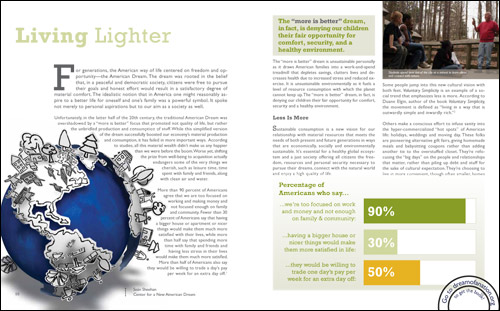Steps to Living Lighter
Over 90% of Americans agree we’re too focused on work and money, and just 30% of people truly believe a bigger house or more money will make them happy. It’s time to get off the treadmill of believing “more is better,” and turn toward things that really matter like family and community. Many people are already beginning to make the shift to living simply and finding true happiness.
 More of What Matters
More of What MattersSince its founding in 1997, the Center for a New American Dream has raised awareness of the negative impact of a hyper-consumer culture, focused on downshifting and finding balance, and helped large institutional buyers shift their procurement to greener alternatives. Learn more.
Read the Center for a New American Dream essay: "Living Lighter"

Endnotes & References